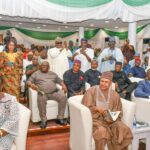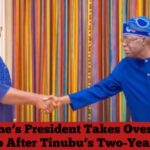Tinubu Was a June 12 Hero, Not a Villain – Presidency Blasts Sule Lamido.
By Raymond Enoch.
The Presidency has categorically refuted as false and revisionist the claims made by former Jigawa State Governor, Alhaji Sule Lamido, that President Bola Ahmed Tinubu supported the annulment of the historic June 12, 1993, presidential election.
In a strongly worded press statement issued today and signed by Mr. Bayo Onanuga, Special Adviser to the President on Information & Strategy, the Presidency described Lamido’s remarks on a live television interview as “a gross distortion of historical facts” and an attempt to rewrite a well-documented chapter of Nigeria’s democratic struggle.
“President Tinubu was—and remains—a steadfast advocate for democracy, in contrast to the record of Lamido and others who capitulated in the face of military oppression and intimidation,” Onanuga stated.
The statement addressed two specific allegations made by Lamido: that Tinubu only emerged politically after the formation of the National Democratic Coalition (NADECO), and that his late mother, Alhaja Abibatu Mogaji, mobilised support for the annulment. Both claims were branded as “patently false.”
According to the release, Alhaja Mogaji, a respected Lagos market leader, had no involvement in mobilising support for the annulment. Onanuga argued that any such action would have cost her her leadership position among Lagos market women.
On the contrary, President Tinubu, then a senator representing Lagos West, was an early and vocal opponent of the annulment. The statement referenced his Senate speech on August 19, 1993, where he condemned the annulment of the election won by Chief Moshood Kashimawo Olawale (MKO) Abiola as “another coup d’état” and decried it as a “self-inflicted crisis” by the military government.
“We have a situation that suggests that the abortion of the June 12 election is another coup d’etat… This is a self-inflicted crisis,” Senator Tinubu said on the Senate floor, just days after General Babangida announced an interim government to succeed his regime.
The statement went further to detail Tinubu’s pivotal role in the post-annulment resistance, recounting how he defied General Sani Abacha’s junta following the November 17, 1993, dissolution of all democratic institutions. Tinubu, alongside other senators like Ameh Ebute and Abu Ibrahim, reconvened in Lagos in protest, leading to their arrest and detention at Alagbon by the military police.
In exile, Tinubu continued to support the pro-democracy struggle, offering financial and logistical backing to NADECO and NALICON (the US-based National Liberation Council of Nigeria), led by Nobel Laureate Prof. Wole Soyinka. His home in Victoria Island was bombed by agents of the military junta in retaliation for his activism.
The Presidency expressed astonishment that Lamido, who served as Secretary of the Social Democratic Party (SDP) at the time, would make such claims. Onanuga reminded Nigerians that Lamido and SDP Chairman Tony Anenih “surrendered the people’s mandate without resistance” and aligned with the rival National Republican Convention to form a weak front that failed to challenge the military.
“To their eternal shame, Lamido and Anenih teamed up with the defeated NRC to deny Abiola his mandate,” the statement asserted.
Addressing Lamido’s claim that Tinubu only became relevant after NADECO was formed, the statement clarified that Tinubu had been deeply involved in the struggle long before NADECO was launched in May 1994. NADECO merely formalised and gave structure to the resistance efforts already in motion.
The Presidency dismissed Lamido’s assertion as not just uninformed but also politically motivated, characterising it as a product of the “Coalition of the Disgruntled”, driven by envy and misinformation.
“We do not want to believe that Alhaji Lamido suffers from what psychologists call ‘tall poppy syndrome,’” Onanuga quipped. “However, the conclusion is inevitable.”
The statement concluded with a strong admonition to Lamido and others peddling what it termed “falsehoods and historical revisionism”. The Presidency maintained that the facts of Tinubu’s legacy in the June 12 struggle are unassailable and urged Nigerians to remain vigilant against political distortions.
“Revisionism does not serve the cause of truth or our nation’s interest,” it warned.










